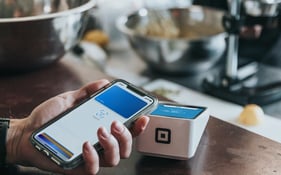Any industry's lingo derives from necessity. A worker or manager needs to be fast, needs to get specific things done, and needs to be understood instantly. Restaurants are no different, though they tend to have a little more fun (read: drinks) than your average button factory. It's no surprise, then, that restaurant slang tends to have a bit of zest to it.
When Anthony Bourdain referred to restaurants as a second home for misfits, he was speaking truth. That unique misfittery aside, the secret language of most restaurants isn’t all that secret. Food service and hospitality work also attract the sort of people who thrive on variety, and who can bring their skillset to literally hundreds of thousands of establishments around America. Of course they develop their own lexicon.
We’ve pulled together some of the most common phrases and terms that you’re likely to encounter if you’re in the industry. But even if your experience in restaurants is only as a diner, you’re going to hear restaurant slang subtly bouncing off the walls — and in common use in your everyday world. Because when an army of misfits find their particular language, after all, many of them adopt it for good.
86
“Eighty-six the avocado toast.”
Anything you are out of is 86’d — snapper in the kitchen, ice cream in pastry, gin behind the bar, if it’s gone (or perhaps ruined) you 86 it. Most restaurants keep an 86 board in the kitchen so people know what’s no longer available. The term can be used more broadly for anything (or anyone) metaphorically canceled: the drunk bros who need to go, or the rude diner who isn’t welcome back. One legend has it that the phrase originated at Delmonico's, a historic New York City steakhouse with 100 items on its menu. Item No. 86, a Delmonico cut steak, was particularly popular and ran out so often staffers came to call out "86" to let each other know they were out.
À la Carte
“That steak comes à la carte.”
Literally “by the card.” A menu item that is à la carte is served by itself, without accompaniments.
All Day
“We’ve got three gnocchi all day and seven branzino all day.”
A way of saying “total” that tallies multiple orders of the same item, to help to keep the kitchen or bar organized when orders are coming fast and heavy. Four orders for chicken on three different tickets, for instance, would be “four chicken all day.”
Apps
“Table 7 is still waiting on their apps.”
Short for appetizers, or starters.
Behind
“Yo, behind!”
A signal to a person in front of you not to make sudden moves. If you’re carrying trays of drinks, or plates with roasted chicken that took 45 minutes, or a piping hot pan, or even just moving behind a person who doesn’t know to expect you, you need to let people around you know. It prevents collisions in and out of the kitchen. Muttering “behind” in everyday situations is a sure sign of a restaurant veteran.
Burning the Ice
“Don’t burn the ice until I make a shift drink.”
Ice needs to get melted in the bins at the end of the night, generally by pouring hot water over it.
Camping
“Table 17 has been camping for two hours!”
When diners are just sitting there. This can come at any point in the meal, but is most commonly used after they’ve paid the check and seem to have no intention of leaving.
Comp
“Comp the drinks on Table 7.”
Something for free! Works as a noun, a verb, an adjective, or as an apology.
Corner
“Corner!”
Much like "behind," workers should yell this when going around a blind corner to alert people to their presence and prevent collisions/close calls.
Cover
“We did 150 covers on Thursday.”
A person at a table. Four people at the table? That’s four covers. At the end of the night, the number of people served will be how many covers the restaurant “did.”
Crumb
“Crumb table 9 before dessert.”
Cleaning the table between courses.
Cut
“Cut me so I can go home.”
Getting to leave! You’ll be back soon, though, so rest up.
Dying
“Run this soufflé before it dies.”
If a dish or cocktail is ready but sits too long before it’s served, it dies. Ice gets too warm, meat gets too cold. Its moment passes. You can’t serve it. Redo it.
Family Meal
“Oh look, family meal is pasta again.”
Food for the crew! Usually these are carb-heavy meals made in bulk for the staff to eat before or sometimes after service.
Fire
“Fire table 34!”
A command to the kitchen to begin working on a dish.
Front of House; Back of House; Back Office
“I only work back of house.”
The three sides to pretty much every restaurant operation. The difference between front of house and back of house constitutes the yin and yang of the operation. FOH consists of public-facing roles and areas: the hosts, servers, bussers, food runners, and bartenders, as well as the bar itself plus the tables and chairs. BOH is the kitchen and related staff. The office is the administrative area.
Floor
“I don’t want to see you on the floor without your full uniform.”
The literal FOH. The floor is the part of the restaurant the guests see.
Heard (or Oui, Chef; Yes, Chef)
“Fire table 9.” “HEARD!”
Calls to confirm you heard the request. This varies by head chef.
The Line
"We're short-staffed on the line tonight."
The space in the kitchen where the cooking and plating is done, so called because it's generally laid out such that line cooks can work shoulder-to-shoulder, with room perhaps for them to turn toward an oven or grill or range without having to walk.
Mark
“Mark table 5 for their main.”
To set up the table with the appropriate silverware for the next course.
Mise
“Do you have the mise you need for margherita pizza?”
Short for mise en place, or “everything in its place.” As a noun, mise can be ingredients and workspace. As a verb it is synonymous with “mark.” Phonetically it's "meez."
Mods
“No, you can’t make 17 mods on the steak au poivre.”
Short for “modifications.” Any changes made to the menu as it appears.
On the Fly
“Need two orders of fries, on the fly.”
When you need something fast. If a dish died and needs to be remade, if a server forgot to order something, if the guest is in a hurry. Pronto.
The Pass
“Need food runners at the pass.”
The place where cooks present finished food to be taken to the table. Sometimes this is inside the actual kitchen; sometimes it’s more exposed. It’s where everything gets organized to go to the dining room.
Pick Up
“Pick up apps on table 2.”
Similar to “fire,” it’s the command to initiate making a dish, or a series of dishes.
Positions or Seat Numbers
“Seat 1 gets the salmon.”
Each chair at every table has an unchanging number. This ensures the food runners know who gets what dishes when they bring the orders.
The Rail
“I love the end of the night when the rail is clear.”
This is the metal bar that holds printed tickets for the line to reference as they're firing orders.
Run the Pass; Expedite
“Who’s scheduled to expo tonight?”
Whoever runs the pass monitors incoming tickets and outgoing plates to make sure everything runs smoothly. Called “expo” for short, this is the interface between BOH and FOH.
Sections
“My whole section is so nice tonight!”
Restaurants are divided into groups of tables, and each group is assigned to a server. This way each server knows which tables they are responsible for and the host can divvy up the workload evenly.
Shift Drink
“I need table 6 to stop camping so I can have my shift drink.”
The much-needed drink you get at the end of the night to decompress. Cheers.
Side Work
“I’m going to fall asleep doing my side work.”
The tasks everyone must handle before and after each shift. FOH might fill ketchup bottles, polish glasses, and fold napkins. BOH makes prep lists and checks inventory for the next shift.
Tag
“Tag the six top.”
To add the gratuity to a check.
Top
“Ask that couple if they wouldn’t mind giving up the eight top.”
The number of possible settings at a table, usually an even number. It can also refer to individual people, i.e., you could have three tops on your four top.
Turns; Turn and Burn
“Where are my appetizers, I’m turning and burning.”
The number of times a table is filled during a shift. If four different groups of guests dined you had four turns. If you get the absolute most turns out of a night you are “turning and burning.”
Upselling
“Nice job upselling that graduation party on the Dom Perignon.”
When a server recommends a more expensive item or additions, to nudge the bill higher. The $2 for avocado on the burger. The extra $3 for sweet potato fries. Helpfully pointing out that if you’re both getting the same wine by the glass, you might as well get the bottle. And will you be having dessert tonight? The tiramisu is fantastic.
Weeds
“I’ve been in the weeds for an hour, and it sucks.”
When you have more things to do than time in which to do them. There are myriad roads to the weeds. The host fills your section all at once. Or the host staggers the tables but they all decide to order at the same time. The variations are “weeded” or “in the tall grass.” Any way you say it, you can’t wait to be out of them.





